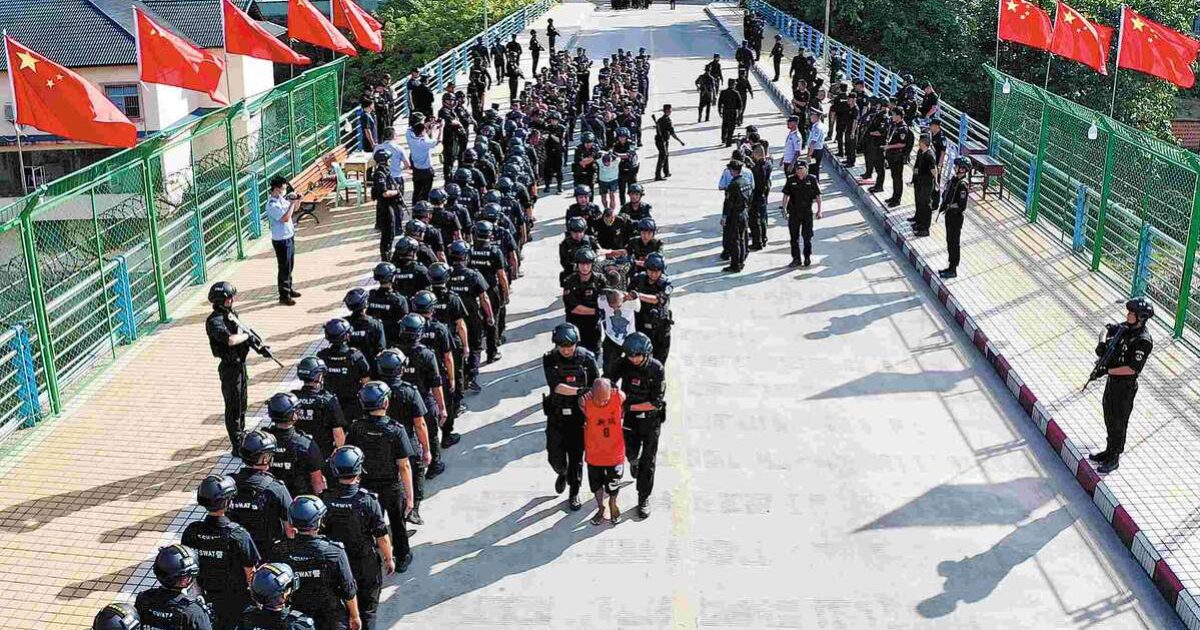Suspects are handed over to Chinese police at the Myanmar–China border. China Daily
Life in Burma (Myanmar) is already difficult enough for the population, with those living in resistance-controlled areas subjected to bombings by government forces, while those in government-controlled areas face repression and tyranny.
Increasingly, people are also being subjected to digital monitoring through payment apps, AI, digital ID cards, facial recognition, and other technologies. The junta’s purpose is to prevent money from flowing to the resistance while also stopping draft-age citizens from fleeing the country now that there is a national conscription. And China is behind this digital repression.
Several Chinese companies have been involved, including Huawei and Geedge Networks (trading as Jizhi Information Technology), which provides products such as the Taingou Secure Gateway (TSG) that uses deep packet inspection to decrypt encrypted traffic. Hikvision, a company sanctioned internationally for its role in the Uyghur genocide, is also implicated, as is the China National Electronics Import and Export Corporation (CEIEC), which is involved in a location-tracking system for the junta.
With Beijing’s support, the junta conducted a census ahead of their sham elections scheduled for next year. The opposition and pro-democracy parties have already been barred from running, making the exercise purely performative. In October 2024, Burma’s military junta carried out a nationwide census, officially framed as preparation for voter rolls in the planned 2025 election. Many Burmese citizens and international observers, however, see it as a pretext for expanding state surveillance.
The census used Computer-Assisted Personal Interviewing (CAPI) technology, with 42,000 enumerators equipped with mobile tablets to collect data from more than 13 million households. The resulting census data has been integrated into a “National Database,” a surveillance tool that combines National Registration Identity Cards (NRIC), SIM registration, and information from other services.
Things are set to become even worse. At the eighth ministerial meeting held earlier this month between China’s public security minister and Burma’s home minister, the junta pledged greater support for China’s Global Security Initiative (GSI). Launched by Xi Jinping in 2022 alongside the Global Development and Civilization Initiatives, the GSI is meant to reshape the world order by positioning China as a global security provider and challenging U.S. dominance. Through forums such as the UN, ASEAN, BRICS+, the Lancang–Mekong Cooperation framework, and the China–Africa Peace and Security Forum, Beijing promotes its security norms as an alternative to Western approaches.
A key feature of the GSI is international policing, which expands Chinese cooperation through training of foreign law-enforcement personnel, joint patrols, and the export of surveillance technology and equipment. The Mekong region serves as a testing ground for this vision. Security and law enforcement are central to Beijing’s strategy, with China presenting itself as a regional security provider to counter organized crime and stabilize border areas.
China has steadily expanded its security presence in the region through initiatives like the Lancang-Mekong Law Enforcement Cooperation Center (LM-LECC), which has enabled the permanent stationing of armed officers in northern Laos and extended Chinese influence into zones such as the Golden Triangle SEZ. This formal policing footprint is reinforced by Chinese private security companies. These firms protect Belt and Road projects, pipelines, ports, and other critical infrastructure, while also providing logistics, site security, and intelligence.
Legal changes, enacted by the Burmese junta, in 2024 now permit them to be armed, often staffed by former PLA soldiers, allowing China to maintain an armed presence without formally deploying troops. Companies such as China Overseas Security Group and CITIC-linked ventures are active in strategic hubs like Kyaukphyu, while others are involved in surveillance and infrastructure projects. Their operations complement Chinese-supplied facial recognition systems, web monitoring tools, and digital ID programs, creating an apparatus that blends physical protection with digital repression.
Although not structured for frontline combat, these security firms extend China’s reach, safeguard its investments, and help the junta tighten its grip on the population while preserving Beijing’s plausible deniability.
These initiatives serve multiple purposes: protecting Chinese nationals and investments abroad, projecting China as a responsible global actor, exporting Chinese policing norms, expanding its intelligence and surveillance reach over Chinese citizens overseas, and reinforcing the legitimacy of the Communist Party at home.
At the same time, China’s security programs prop up the generals, deepen repression of the civilian population, and make it harder for the resistance to oust the junta. As a result, the war drags on endlessly, Beijing grows wealthier while the Burmese people continue to suffer and die.
The post Burma Junta Supports China Global Security – Life is About to Get Worse in Burma appeared first on The Gateway Pundit.











